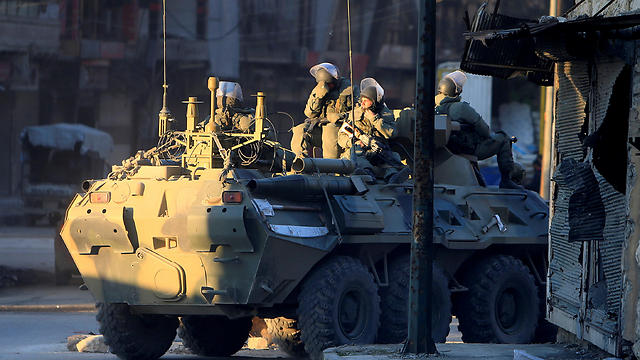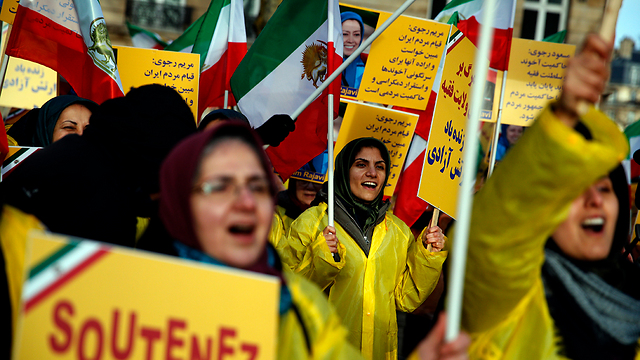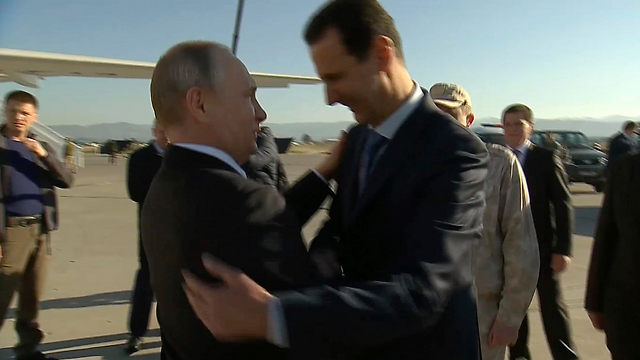

The lessons of the Holocaust and Syria
Analysis: Russia was among the countries whose citizens were killed in Nazi gas chambers during World War II. Today, however, it condones the use of such chemical warfare by the Assad regime in Syria. What are the American options and objectives for a strike in Syria—and where does Israel fit into the thicket of interests?
Current tensions in Israel's northern sector have a bone-chilling historical link to Holocaust Memorial Day, which begins Wednesday evening. They are both linked by the usage of chemical weapons and noxious gases against defenseless civilians.
Germans were the first to use mustard gases in World War One. Nobody stopped them or punished them, and so they once again used deadly gases on an industrial scale to put to death millions of civilians in World War Two. The international protocol signed in the two world wars' interim did little to deter them from doing so.
Today it is Russia that is using them—the former victim of Germany during World War Two, many of whose civilians were slaughtered by gas along with the Jews of other countries.

They are the ones spearheading the use of chemical weapons (poisoning is also considered the use of chemical weapons)—against those individuals in their population that they consider to be traitors—while also sponsoring a ruthless Middle-Eastern despot such as Bashar al-Assad and allowing him to butcher his own people with chemical weapons.
The conclusion is clear: international law and conventions are not worth the paper they're printed on—if there's no one to enforce them. If the US, therefore, does not act decisively in retaliation to the Russian sponsored use of chemical weapons by the Assad regime, many more states will follow in Syria's footsteps.
It may be assumed that US President Donald Trump will back up with actions his words to attack the Syrian regime as a punitive measure for its use of chemical weapons against its own countrymen.
Nevertheless, Trump does not wish for the US to act alone in this endeavor—and rightfully so—but as part of an international coalition currently in the formulation stages.
The American need to act as part of a coalition stems from their desire to be afforded legitimacy outside the halls of the United Nations for military action against a sovereign state, and to make clear the objection to using chemical weapons is not an American whim but a value shared by the entirety of the enlightened, democratic world.
French President Emmanuel Macron has already announced his country will take part in any such punitive measures against Syria, but Trump needs additional partners from the international community rather than only European ones. That, it may be assumed, is the chief reason for the delay in the American response.
The second reason, however, is the American need to allow their allies as well as other countries to prepare themselves for a possible tit for tat on the part of Russia and the Syrian regime for any attack on Syrian soil.
International aviation authorities, for their part, have announced the eastern basin of the Mediterranean as a zone dangerous for civil aviation in the next 72 hours, but Americans and their allies must also gird themselves for Russian President Vladimir Putin to strike elsewhere.
These other possible avenues for retaliation range from ramping up hostilities in the Ukraine, through electronic warfare disrupting coalition actions against the Islamic State in Syria and Iraq.
More than anything else, however, it is not unthinkable for Russia to utilize its cyber warfare capabilities to cripple the civil and military infrastructures of the US and its allies, if the superpower is hit in Syria.
Russia may also use economic means, such as halting the flow of gas to Europe through the Ukraine in response to a possible American attack.
All of these means are well within the Russians' reach, but it is more than likely that if the American offensive homes in on the regime itself and its military assets, the Russians may contain their retaliation to political-diplomatic channels, rather than outright warfare.
Despite his proclamations, Putin must not be willing to risk vital Russian interests and Russian troops to defend his client, the butcher of Damascus.
It all boils down to interests. Russia isn't in Syria because of its immense fondness for Assad, but because it is promoting its global and regional agenda by so doing. It will not sacrifice Russian interests or human lives for the preservation and welfare of the Assad regime, or for the Iranians to continue their strive to Middle-Eastern hegemony.
Tensions in the north, therefore—in anticipation of the American attack—are justified, but a global war is not likely to break out even if that strike does happen.
Rebuilding deterrence and credibility
The American need to strike in Syria stems from three reasons. Firstly, rebuilding the American strategic deterrence in the world in general and in the Middle East in particular.
This deterrence suffered a grievous blow during the term in office of former president Barack Obama, but the US can still use a well-timed show of strength and determination to keep its word and rehabilitate its standing as the world's foremost political and military power.
In so doing, it may also set an example for other countries carrying out crimes against humanity, much like the Syrian regime.
This show of determination will have a deterring effect not only on Russia, however, but also on North Korea, Iran and any other countries breaching international law and interested in manufacturing or developing unconventional arms.
The second reason the US is hard-pressed to avoid striking is its need to restore its credibility and leading status among its East Asian and Middle Eastern allies. Belief in the Americans' ability to come to the aid of countries attacked by North Korea or Iran was greatly shaken in Japan and South Korea, for instance, as well as in Saudi Arabia.

Many in Israel's Cabinet and defense establishment are also skeptical as to whether the US will come to our aid in our own time of peril. If the US does not strike, this feeling will only be reinforced—in Israel as well—leading to the strategic perception that we should act without taking international opinion into consideration, since no one will do the job for us—for instance as it pertains to stopping the Iranian nuclear program or the country's entrenchment in Syria.
The third reason the US should act is to send a message to the international community that using chemical or otherwise unconventional weapons is illegitimate, despite the fact that Russia uses it and allows Syria to do the same.
It is for these three aforementioned reasons that Jerusalem believes President Trump must act, or the damage caused to the US's international standing, deterrence and—finally—also to its economy will be far worse than the damage caused during the Obama presidency.
Five guiding rules will most like steer the US in planning the action American armed forces will undertake. Chiefly among them is the rule stating that the targets hit and the damage caused to them must be directly linked to Assad's use of chemical weapons.
The second rule the Americans will adhere to is to avoid civilians uninvolved in the fighting in Syria.
The third rule is to abstain from harming Russian civilians, military personnel or installations on Syria soil. Washington will also want to avoid hitting any Iranian assets, so as not to drag these two countries into the conflict and opening a possible cyber warfare and terror front against the US and its allies.

The Americans will do their level best for Russia, Iran and Hezbollah to stomach the blow to the Syrian regime, without issuing any retaliatory action.
The fourth rule is to act from within an international coalition. The fifth and last rule is to refrain from deploying American ground forces in the punitive measures, so as not to sink into the Syrian mud, so to speak.
These five reasons, then, lead us to believe that military means the Americans will use will include cruise missiles launched from American destroyers in the Mediterranean, and precision-guided ordnance launched from fighter jets at Syrian targets from a distance of hundreds of kilometers.
It may also be assumed that electronic blocking measures will be used along with disruption of Syrian radar systems, but American vessels and aircrafts in the Mediterranean will nevertheless act in a manner preventing any close brush with Syrian air forces on Syrian soil.
A complex task for Israel
It's likely the Americans will attack three groups of targets. The first group is symbols of the Syrian regime, targeted to weaken Assad's regime in a manner putting him off using chemical weapons against his civilians or Israel again. Harming the palace in which the Assad family resides—after forewarning for them to evacuate it—is an example.
Harming the Syrian army and air force's command headquarters near the presidential palace is also an option, as are command and control centers directly linked to the utilization of chemical weapons.
The second group includes military targets, which will be hit solely to weaken Assad's army in such a way to bolster the spirits of the rebel groups fighting him and necessitating the Russians and Iranians to reequip it.
Such a strike will hinder the process of the Syrian takeover of all of Syria's territory, thereby levying an immense economic burden on both the Iranians and Russians.
If the American damage is large-scale, moreover, Russian will have to foot the bill for hundreds of millions of dollars for recouping Assad's armament caches and rehabilitating his military. Iran, too, will be forced to invest hundreds of millions of dollars to preserve Assad's strength and defend his regime.
In this context, it should be remembered that the Russian economy's fortunes are dire as it is, and the Iranian economy is finding it hard to bounce back as well, with the economic situation in the Middle Eastern juggernaut leading to anti-regime protests.

The third grouping of targets contains installations for the development and production of weapons in Syria—mostly of the chemical variety.
To hit all three of these target groups, hundreds of cruise missiles, bombs and precise surface-to-air missiles. This means the cost of the attack will be significant and the likelihood of errors leading to innocent lives lost greater.
It is therefore extremely likely for the Americans to choose a handful of symbolic targets in each of the target groups to hit. The effect will be mostly symbolic and geared towards deterrence, and it will be less practical.
Even if the Americans attack, war in the north remains unlikely. From an Israeli perspective, it is better for the US to strike despite the attendant dangers. Otherwise, Assad and Iran will consider the American abstention from action as legitimizing the development and even deployment of unconventional weapons.
Israel can ill afford that eventuality and the IDF may then be forced to act in regions where the Americans have not. Israel will sit out of the American coalition because it has no interest in exacerbating a growing rift with Russia, and has no reason to join its allies in the first place if they carry out a strike themselves.
Israel's chief goals in Syria at the moment are twofold: to prevent the military entrenchment of Iran and the militias operating on its behalf and to avoid as much as possible involvement in the Syrian all-out war.
This is a complex task, because the threat posed by Iran is severe and the Islamic republic is more than likely prepared to realize that threat by hitting Israel, following the killing of their people and destruction of their advanced weapons systems in the Tiyas Military Airbase in the attack foreign media has attributed to Israel.
The Iranians are nevertheless unlikely to make good on such retaliation from either Syria or Lebanon. It's likelier for them to carry out a retaliatory strike using the Islamic Revolutionary Guard Corps's Quds Force and its overseas terror attack apparatus farther down the line.
Estimates now say Iranians have a vested interest in allowing Assad's regime to stabilize, and will therefore prefer to avoid any action providing Israel the pretext to strike at Assad's regime or their men on the ground in Syria.





















